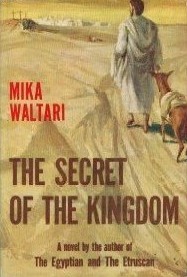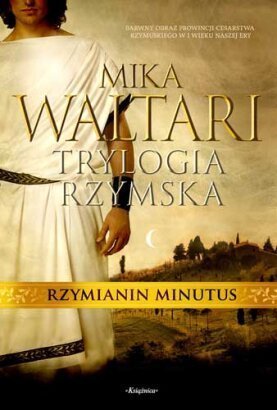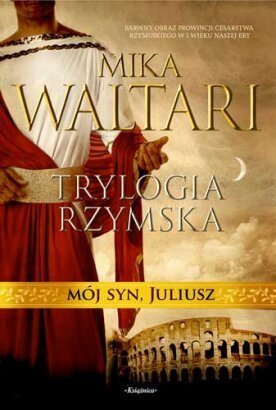


Books in series

The Secret of the Kingdom
1959

The Roman
1964

Rzymianin Minutus
2012

Mój syn, Juliusz
2012
Author

Mika Toimi Waltari was a Finnish historical novelist, best known for his magnum opus The Egyptian. Waltari was born in Helsinki and lost his father, a Lutheran pastor, at the age of five. As a boy, he witnessed the Finnish Civil War in Helsinki. Later he enrolled in the University of Helsinki as a theology student, according to his mother's wishes, but soon abandoned theology in favour of philosophy, aesthetics and literature, graduating in 1929. While studying, he contributed to various magazines and wrote poetry and stories, getting his first book published in 1925. In 1927 he went to Paris where he wrote his first major novel Suuri illusioni ('The Grand Illusion'), a story of bohemian life. In terms of style, the novel is considered to be the Finnish equivalent to the works of the American writers of the Lost Generation. (In Waltari's historical novel The Adventurer, taking place in the 16th century, the hero is a Finn who goes to Paris during his twenties and lives there a rather bohemian life). Waltari also was, for a while, a member of the liberal literary movement Tulenkantajat, though his political and social views later turned conservative. He was married in 1931 and had a daughter, Satu, who also became a writer. Throughout the 1930s and 1940s, Waltari worked hectically as a journalist and critic, writing for a number of newspapers and magazines and travelling widely in Europe. He directed the magazine Suomen Kuvalehti. At the same time, he kept writing books in many genres, moving easily from one literary field to another. He had a very busy schedule and strict work ethic. It has been claimed that he also suffered from insomnia and depression, sometimes to the extent of needing hospital treatment. He participated, and often succeeded, in literary competitions to prove the quality of his work to critics. One of these competitions gave rise to one of his most popular characters, Inspector Palmu, a gruff detective of the Helsinki police department, who starred in three mystery novels, all of which were filmed (a fourth one was made without Waltari involved). Waltari also scripted the popular cartoon Kieku ja Kaiku and wrote Aiotko kirjailijaksi, a guidebook for aspiring writers that influenced many younger writers such as Kalle Päätalo. During the Winter War (1939–1940) and the Continuation War (1941–1944), Waltari worked in the government information center, now also placing his literary skills at the service of political propaganda. 1945 saw the publication of Waltari's first and most successful historical novel, The Egyptian. Its theme of the corruption of humanist values in a materialist world seemed curiously topical in the aftermath of World War II, and the book became an international bestseller, serving as the basis of the 1954 Hollywood movie of the same name. Waltari wrote seven more historical novels, placed in various ancient cultures, among which The Dark Angel, set during the Fall of Constantinople in 1453 is probably the best. In these novels, he gave powerful expression to his fundamental pessimism and also, in two novels set in the Roman Empire, to his Christian conviction. After the war, he also wrote several novellas, showing particular mastery in this genre. He became a member of the Finnish Academy in 1957 and received an honorary doctorate at the University of Turku in 1970. Waltari was one of the most prolific Finnish writers. He wrote at least 29 novels, 15 novellas, 6 collections of stories or fairy-tales, 6 collections of poetry and 26 plays, as well as screenplays, radioplays, non-fiction, translations, and hundreds of reviews and articles. He is also the internationally best-known Finnish writer, and his works have been translated into more than 40 languages.